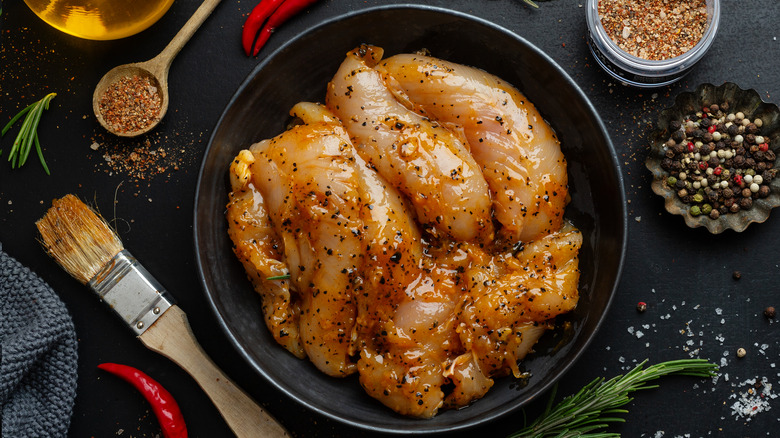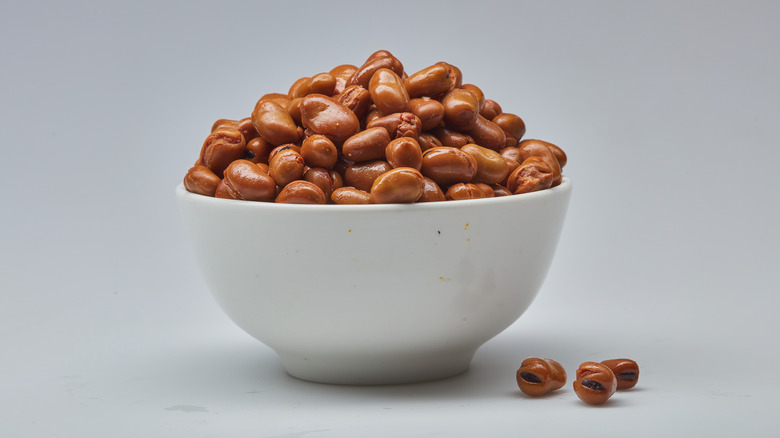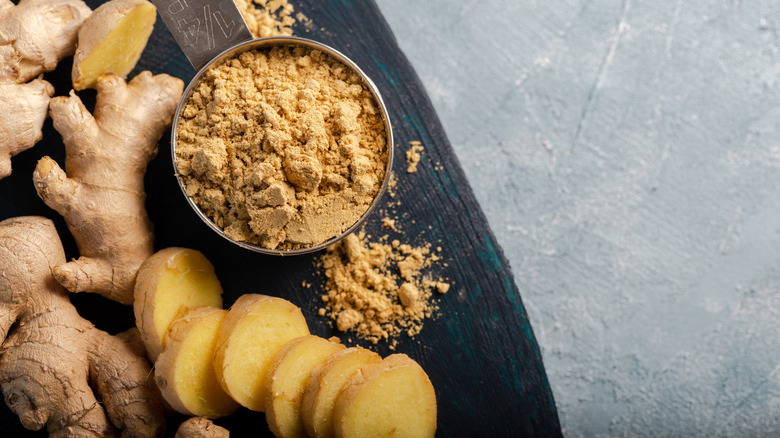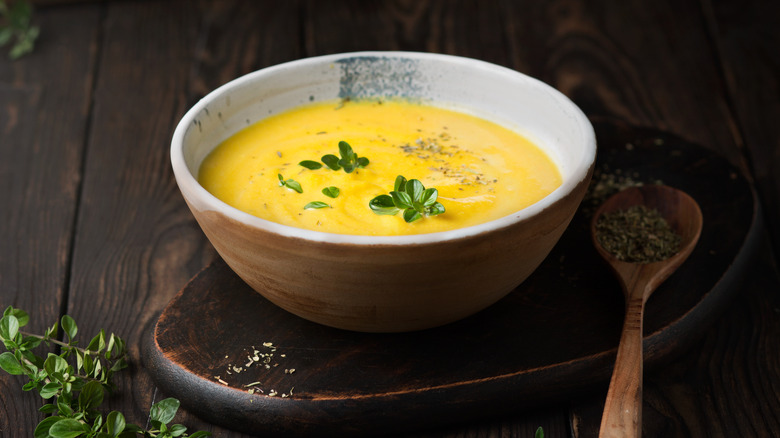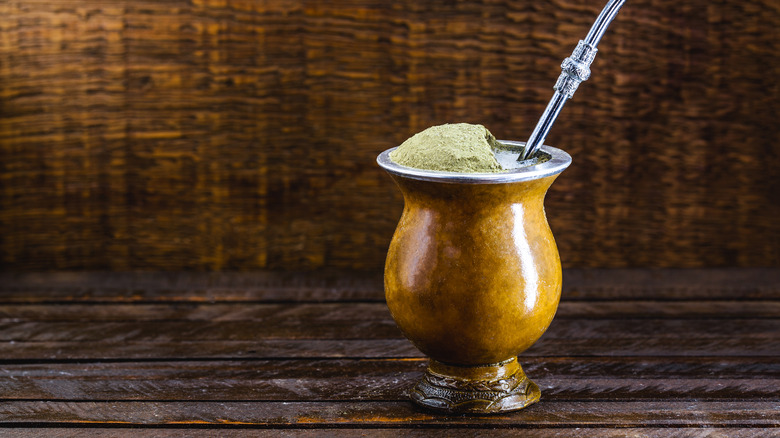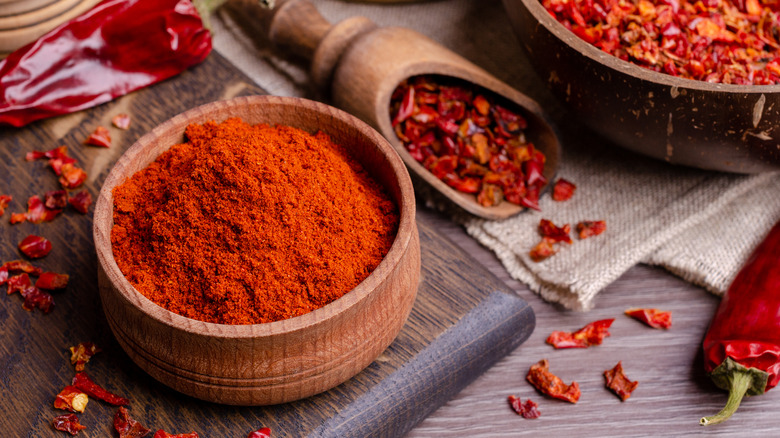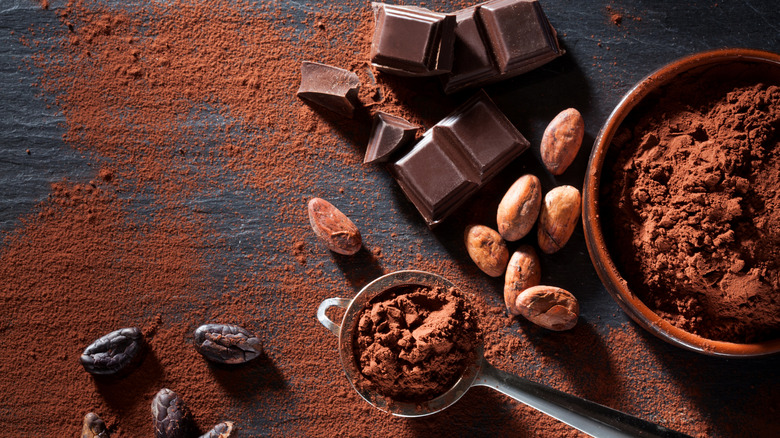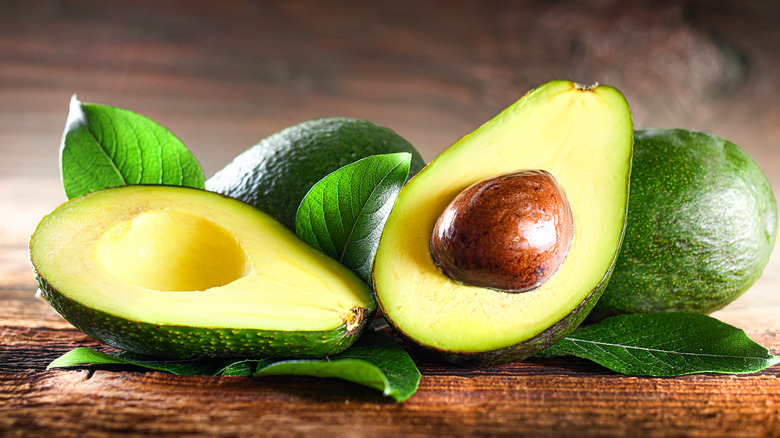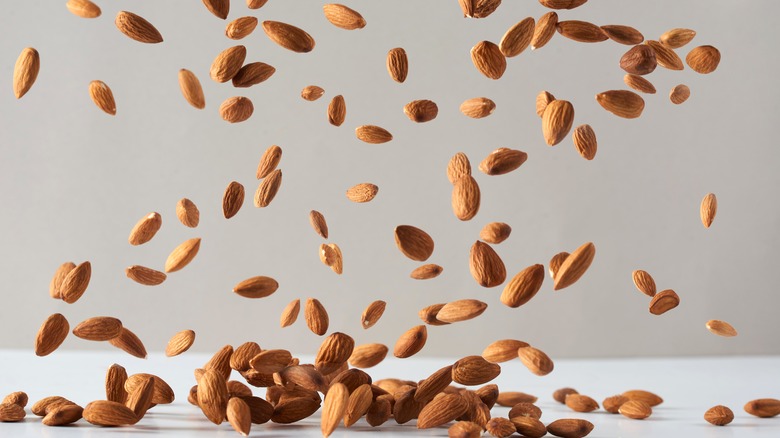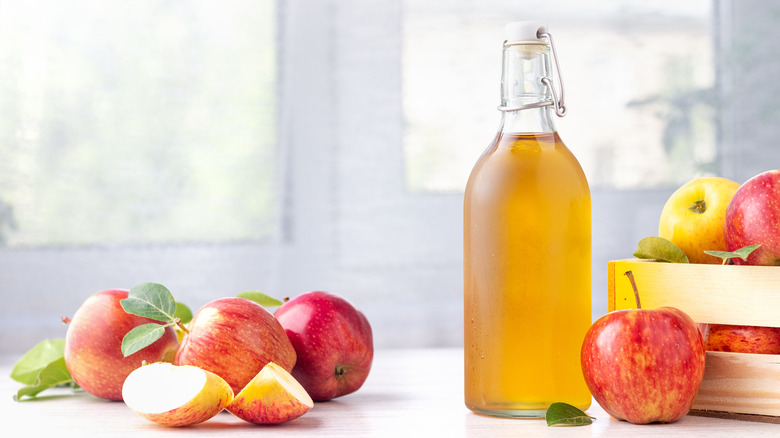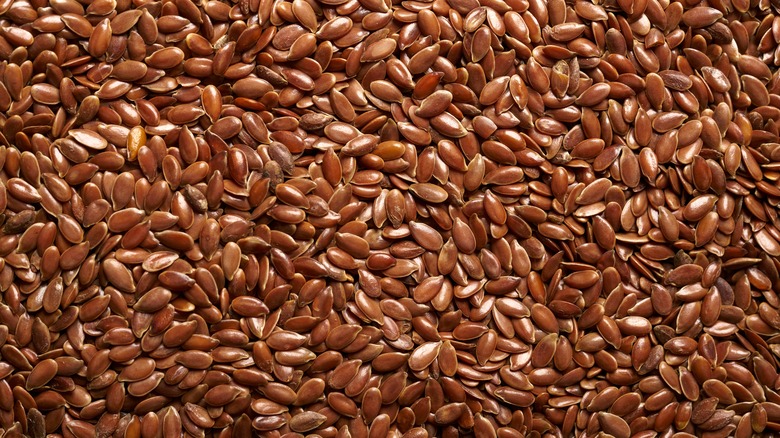14 Foods That Help Curb Hunger
It's a familiar routine. You wake up, ready to embrace another day, and have a breakfast that you think is going to see you seamlessly through to lunchtime. You head out the door, and by 11 A.M. ... your stomach is rumbling more intensely than a Mack Truck rolling down a dirt road. Yes, friends, you're hungry again. Hunger pangs occur when our stomachs empty out, usually around two hours after eating, prompting a release of hormones that tell us we need to eat, according to Medical News Today. And dealing with them between meals is no small thing, and can leave us scratching our heads about why what we thought was a big lunch has left us reaching for the snacks by around 3 pm.
But the thing is, it might not be how much you eat, or even when you eat that governs your hunger — it's also what you eat too. There is a range of foods out there that are less good for keeping us satisfied, but there is also a variety of foods that are great for curbing hunger. And we decided, after one too many evenings spent lamenting the fact that we're still ravenous after dinner, to get them all in a list, so you can benefit from them as much as we will. Let's take a look at the best foods to curb hunger.
Chicken breast
Sometimes, the simplest foods are the best. And if you're sick of searching for ever-more trendy and complicated foodstuffs to keep your hunger at bay, you need to look no further than a simple chicken breast. Chicken breast is an excellent food to reduce hunger, mainly due to its high quantity of lean protein. "You are most likely to feel fuller after eating protein than other nutrients, including fiber, and one of the theories behind why higher-protein diets work well with weight loss is because it helps you not feel hungry," says Wayne Campbell, nutrition professor at Purdue University, to WebMD.
When we eat protein, it prompts our body to make less ghrelin, the hormone that tells us we're hungry, than when we eat foods and meals higher in carbs, according to research published in The American Journal of Clinical Nutrition. This naturally leads to us feeling like we need to eat less, and therefore eating less. A previous study, also published in The American Journal of Clinical Nutrition, found that when people boosted the overall percentage of protein in their diets and as an energy source, they ended up eating fewer calories overall throughout their day. And if you're not a fan of chicken, the good news is that many foods high in protein will assist in keeping hunger at bay, especially if you're eating them at breakfast, says WebMD.
Beans
In our humble opinion, beans are a miracle food. Cheap, endlessly versatile, and packed with vitamins and minerals, it's hard to go wrong with throwing beans into your food (per Healthline). And when it comes to foods that keep you satisfied, beans are probably our pick of the list, thanks to two essential components: protein and fiber. The protein in beans provides your body with satiating nutrients that take longer to digest (per the Cleveland Clinic), but it's the fiber that really takes things to the next level.
When you eat high-fiber foods, the body's digestive process is slowed down, because fiber moves through your system differently than other nutrients, says Medical News Today. This means that your stomach remains satisfied for longer, and you get less hungry throughout your day. Research published in Trends in Food Science & Technology points towards fiber, along with protein, being one of the most effective nutrients for satiety, which is good news for fans of beans, given that they're loaded up with both. If you want to make sure you're choosing especially fibrous beans, white beans and navy beans are your best bets, although virtually any bean variety you pick will give you a fiber boost, says WebMD.
Ginger
The health benefits of ginger are pretty wild, y'all. For such a small plant, this humble spice provides you with more antioxidants than we know what to do with, and can help to protect against chronic conditions, provide anti-inflammatory effects that reduce arthritis symptoms, safeguard your gut health and ease nausea, and lower your blood sugar (per WebMD).
And if that wasn't enough, ginger may also have a powerful effect on your hunger levels. A study published in Metabolism seemed to provide evidence of this when it examined the effects of drinking a "hot ginger beverage" on hunger levels and feelings of fullness. The study found that after drinking the ginger drink alongside breakfast, people exhibited less hunger, felt more full overall, and expressed less of a desire to eat. It should be noted that this study was pretty small, with only ten participants, and so further study may be needed to fully confirm the satisfying effects of ginger. But with the number of health benefits it could give you besides that, we'd say that throwing some ginger into your evening meal is nothing but a good idea — and it may well leave you less hungry afterward.
Soup
On a psychological level, there are few things more satisfying than a bowl of warming soup. And as it turns out, that psychological satisfaction may also be physical, and having soup as a meal, or before a meal, may leave you feeling less desire to eat later down the line. Researchers conducted a study that looked at the effects of eating a variety of soups on hunger levels, specifically when it was eaten before lunch (via Appetite). They found that when participants ate low-energy-dense soup before a main meal, they ate approximately 20% less overall.
What was particularly interesting was it didn't seem to matter very much what form the soup came in. While researchers assumed that chunkier soups would prove more filling, soups of all forms were found to be as satisfying as each other, which will be music to the ears of smooth soup fans out there. Adding additional protein or fiber to your soup may cause it to fill you up even further, thanks to the nutrients taking longer to digest.
Yerba mate tea
Sometimes, it feels like there's a tea for everything – for stress, for waking you up, for sending you to sleep. And while some of these may leave you feeling exactly the same as you did before, and silently fuming at the money spent on them, one tea that does seem to affect hunger, in particular, is Yerba mate. This herbal, caffeinated tea was examined in a study published in Nutrients for its effects on hunger. Researchers found that when Yerba mate was drunk in combination with exercise, it appeared to reduce feelings of hunger amongst participants, more so than if people were just exercising alone. Interestingly, the tea also seemed to put the participants in a better mood, and sped up their metabolisms.
The researchers involved in the study proposed that it was Yerba mate's unique composition that created the specific effects on hunger. It could also well be down to the drink's caffeine content, which has long been proposed to suppress appetite, and which was shown to do so in a study published in The International Journal of Food Sciences and Nutrition.
Chili peppers
Are you a fan of spice? For some, no meal is complete without slathering it in hot sauce; for others, they're ordering the mild, with a glass of milk on the side. But if you can stand the heat, you might want to try adding some chili peppers into your food if you're looking for ways to reduce hunger. "Spicy red peppers turn on receptors in our mouths that cause us to feel burn. This gives a 'kick' to the system that triggers our bodies' fight-or-flight response," says Bowling Green State University's associate professor of clinical nutrition Mary-Jon Ludy to CNN. When your fight-or-flight kicks in, driven by your sympathetic nervous system, you start to feel less hungry, and your metabolism also speeds up.
This is corroborated by a study published in the British Journal of Nutrition that looked at the effects of consuming red peppers. Researchers found that when red peppers were eaten as part of an appetizer before lunch, people then ate less in the subsequent meal and afterward. This effect is primarily caused by the capsaicin in the red peppers, the active ingredient that gives them their spicy taste and burning heat.
Dark chocolate
Okay, so we're well aware that it may sound ridiculous to state that eating chocolate may cause you to eat less overall. But, we wouldn't be entirely wrong in doing so, folks. Dark chocolate in particular may be a key to reducing hunger, according to a study published in Nutrition & Diabetes. The study compared the effects of eating dark chocolate and milk chocolate on hunger levels and found that after eating dark chocolate, people were substantially less hungry and were likely to eat less compared to those who ate milk chocolate.
There were a few reasons that the researchers suggested for this. The first was the intensity of the flavor of dark chocolate, which may reduce the desire to eat further, in contrast with the smoother, lighter taste of milk chocolate that may not have such an effect. There was also a higher fat and protein level in the dark chocolate, which may have left the participants more satisfied. One thing to point out about this study, though, is that the people taking part in the study were required to eat 100 g of chocolate in one go each time, first thing in the morning. While this may sound like a dream come true to some, it might not be something that everyone can do to curb hunger.
Celery and peanut butter
In our opinion, few food combos go as well as celery and peanut butter (although, few food combinations go as well as anything with peanut butter). The natural ridge shape of the celery even makes a perfect little serving boat for the smooth, crunchy paste — what's not to love?
And if you weren't already a fan, maybe the revelation that celery and peanut butter is one of the best foods for hunger will get you on board. This is thanks to the triple-action of the nutrients you're getting in the snack: fiber, protein, and fat, according to Healthline. The fiber comes from both the celery and the peanut butter, and works with the protein and fats from the peanuts to fill your stomach with longer-to-digest foodstuffs that'll keep you going for hours. Understandably, some people may be reluctant to snack on such a high-energy food as peanut butter. But research published in the Journal of Food Science and Technology indicates that while peanuts and peanut butter are certainly higher in fat, they don't seem to lead to weight gain when incorporated into your diet. So crack open that tub and slice that celery, folks!
Avocado
Honestly, if we had a dollar for every time we talked about how good for us avocados are, we'd be pretty rich by now. And every time we think we're done discussing them, some other health benefit comes along. This time, it's the avocado's effect on hunger that we want to shine a light on, and frankly, folks, it's pretty impressive. As well as their fiber levels, this is also down to the fruit's levels of a specific omega-3 fat called oleic acid, according to CNN.
When oleic acid is ingested, the body converts it to something called oleoylethanolamide, or OEA for short. "Freshly formed OEA travels to the nerve fibers that lie beneath the gut lining and tells them to send a satiety signal to the brain," states the University of California's professor of anatomy and neurobiology, pharmacology and biological chemistry Daniele Piomelli to CNN. Piomelli's claims are confirmed in a study published in Food & Function, which demonstrated that eating foods with oleic acid in them resulted in people wanting to consume less afterward. And if you're not a fan of avocados, never fear: Nuts, seeds, and olives can all supply you with a robust oleic acid intake.
Spinach
It's pretty much always a good idea to add some spinach to your meal. (Hey, if it was good enough for Popeye ...). Not least because throwing a few handfuls of spinach into a stew or a salad could leave you way more satisfied than if you didn't. Spinach is especially high in a certain type of membrane protein called thylakoids, according to research published in the Scandinavian Journal of Gastroenterology. If you haven't heard of them, you may well have already felt their effects when you eat spinach, as thylakoids appear to have an appetite-suppressing function. Participants in the research who consumed thylakoids alongside a high-energy meal exhibited lower levels of hunger hormones, and therefore less hunger.
It's not just in spinach that you can find thylakoids. The membrane protein is also present in other leafy greens like kale and mustard greens, as well as broccoli, according to Prevention. As a bonus, these foods also pack a huge fiber punch, which will provide further satiety.
Almonds
For such a little food, almonds pack a lot of goodness. As well as being supremely tasty and versatile, the nut is also full of essential minerals like phosphorus and calcium, which will help your bones stay strong and healthy, per WebMD. Their combo of healthy fats and fiber may also contribute to better blood sugar control, and their antioxidant and anti-inflammatory properties can protect your heart.
Pretty good, right? And the pièce de résistance? They may also curb your hunger better than many other foods out there. According to a study published in the European Journal of Clinical Nutrition, almonds provide a satisfying effect after eating them, lowering people's hunger levels and urge to eat pretty notably. The nuts have two specific nutritional components which help them do this. Their higher fat content leaves you feeling more satisfied and less likely to snack afterward, while their fiber content fills your stomach up without being digested, again leading to a greater level of satiety. Other nuts out there, like hazelnuts and cashews, will also provide you with that winning combo of fiber and fat.
Apple cider vinegar
It feels like apple cider vinegar has a function for everything, from lowering blood sugar to fighting harmful viruses and bacteria, according to Healthline. But while you might be drinking apple cider vinegar to keep a cold at bay, you may also be making yourself less hungry. Apple cider vinegar has been observed to have some powerful effects on hunger, particularly in a study published in the European Journal of Clinical Nutrition, which looked at its effects on stomach contents. The study found that when participants drank apple cider vinegar alongside an especially starchy meal, their stomachs emptied more slowly, meaning that they felt fuller for longer.
A further study looking at the effects of vinegar on appetite more generally found that consuming it led to less hunger overall. But for newbies to apple cider vinegar out there, figuring out how exactly to ingest it may be tricky. Try mixing a tablespoon or two with a glass of water and drinking it alongside a meal, as Medical News Today suggests. You can also add your apple cider vinegar to salad dressings or marinades, or mix it into homemade condiments.
Popcorn
Now and again, we all need a snack. And why not?! A snack is one of life's greatest pleasures and can give you a much-needed energy boost between meals. But the snack that you choose can make or break your hunger levels, so if you're looking for one that will keep you satisfied for longer, opt for popcorn. According to a study published in Nutrition Journal, in a side-by-side comparison of popcorn and potato chips, popcorn was found to be way more satiating, despite being lower in energy density.
So why is popcorn such a boss snack choice? Well, as a high-fiber whole grain, popcorn is not only more satisfying thanks to its fiber content, but is also a heart-healthy choice, according to the American Heart Association. Crucially, though, how you eat it makes a huge difference to its potential health benefits — for instance, we'd assuming that getting it in the movie theater won't do your body any good. "Even a small movie theater popcorn has significant calories and is very high in salt. Sodium is one of the leading risk factors for hypertension and stroke in general, so it's something we do care about from a perspective of heart disease," says University of Rhode Island assistant professor in the department of nutrition and food sciences Maya Vadiveloo to the American Heart Association. For the optimum benefit, air-pop your popcorn and flavor it lightly with seasoning.
Flaxseed
A little bit of flaxseed can go a long way, people. This tiny little seed is packed with antioxidants and lignans, as well as protein, fiber, and healthy fatty acids, according to Medical News Today. And several of these qualities contribute to making it one of the best choices to help keep hunger at bay. The fatty acids, specifically, will assist in keeping your blood sugar levels stable, even when you're eating the flaxseeds alongside more potentially glucose-spiking foods like simple carbs (per CNN). This will help you to avoid a blood sugar spike and crash, and the hunger that comes with it.
Additionally, flaxseed's fiber content keeps your belly feeling nice and full. This fiber can bulk up in your stomach and moves through your system more slowly than digested food, leaving you with less of a need to eat. And the best part is, flaxseed is an infinitely versatile little addition to your meals that can kinda go in anything. Sprinkle it on top of stews or salads, or throw it in alongside the flour in your baked goods. You can also stir it into your morning oatmeal or cereal to help supercharge its fiber content and keep you ticking until lunchtime.


